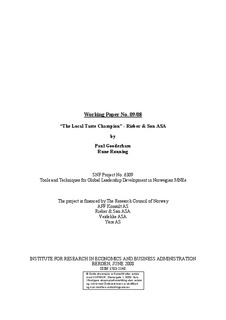| dc.contributor.author | Gooderham, Paul N. | |
| dc.contributor.author | Rønning, Rune | |
| dc.date.accessioned | 2008-08-28T08:46:11Z | |
| dc.date.available | 2008-08-28T08:46:11Z | |
| dc.date.issued | 2008-06 | |
| dc.identifier.issn | 1503-2140 | |
| dc.identifier.uri | http://hdl.handle.net/11250/166254 | |
| dc.description.abstract | Rieber & Søn is a Norwegian multinational food company that currently has fully-owned production units in seven European countries and sales and market offices in a further six countries. The purpose of this rich case study is to explore Rieber & Søn’s ability to achieve knowledge flows and innovative products across its operations. Like any multinational company Rieber & Søn has had to decide on a balance between global integration and local adaptation. Drawing on a range of interviews with key personel as well as current and historical company documents we explore this balance and discuss its implications for inter-unit knowledge flows. The focus of the study is the business units Toro (Norway), Vitana (Czech Republic), Delecta (Poland ) all of which specialize in dry foods. These three business units are often referred to by Rieber & Søn headquartered managers as constituting a “triangle of business units”. In addition we also include King Oscar, a seafood operation, because of its close links to this triangle. | en |
| dc.language.iso | eng | en |
| dc.publisher | SNF | en |
| dc.relation.ispartofseries | Working paper | en |
| dc.relation.ispartofseries | 2008:09 | en |
| dc.title | “The local taste champion” Rieber & Søn ASA | en |
| dc.type | Working paper | en |
| dc.subject.nsi | VDP::Samfunnsvitenskap: 200::Økonomi: 210::Bedriftsøkonomi: 213 | en |
